#then she refused as a retaliation because he refused to read her recommended books
Text

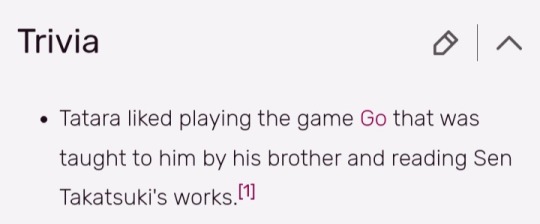
I want to see Hide and Tatara having a Go match
#go was invented by an emperor who wanted to teach his son concentration and discipline and strategic thinking#maybe thats why yan taught tatara#maybe tatara was a bright yet difficult child (his short temper) so yan taught him this to make him more patient#kinda want to see tatara try to teach eto go too so he would have someone to play with#then she refused as a retaliation because he refused to read her recommended books#maybe tatara taught ayato (too impatient for this so he gave up) and tomoe too
10 notes
·
View notes
Note
So, I'm writing an essay on the whole STATE of misogyny in WC for one of my university classes, and I was wondering if I could ask you a couple of things! No pressure of course, please feel free to say no!
A) Could I reference your good takes with appropriate harvard referencing and links back to your blog?
B) Are there any specific moments from the books that you think should be covered the most?
C) The end result will be a visual essay, so it's like those fun infographics people on Tumblr make on like ADHD and stuff, so when it's done, would you like to be tagged to read it?
(Sorry for anon, I'm nervous lmao, but if you'd be more comfortable I'll resend this off anon)
AAY good topic! You've got a lot to work with. Absolutely feel free to reference anything I've written, and tag me when you're done.
While you're here and about to write something so legitimate, I'm also going to recommend you check out Sunnyfall's video on gender in Warrior Cats. She breaks down the arcs into numbers, directly comparing the amount of lines mollies have to toms, and examining the archetypes women are usually allowed to be.
I think it's a must-have citation in a paper about WC misogyny.
...and, I think it's insightful to look at the WCRP Forum thread about the video. Note how the respondents immediately come into the thread to complain about how the video is too long so they didn't watch it, dismissing Sunnyfall as not being entertaining enough to hold their attention, even whining that she starts with statistics to prove her point, which I'm convinced she did exactly because they would have cried that she "had no evidence" if she didn't.
I am not a scholar, so I don't know how to document or prove that the books have an impact on the audience outside of anecdotes. But I think if you do write a section about fandom, it would be worth mentioning the in-universe and metatextual apologia for Ashfur and its reflection in the real world discourse, the authorial killing of Ferncloud because of fan complains, and the utter defensiveness against the discussion of misogyny you see outside of Tumblr.
You may also want to check out Cheek by Jowl, a collection of 8 essays about sexism in xenofiction by Ursula K. Le Guin. There's a very unique manifestation of authorial bias in animal fiction, having a lot to do with how the author views "the natural world," and it's worth understanding even though Warrior Cats are so heavily anthropomorphized.
So... Warrior Cats Misogyny
I think discussing individual instances can be helpful, but I'd implore you to keep in mind what's REALLY bad about WC's misogyny is framing and the bigger picture.
Bumble's death is shocking and insulting, but it's not just that she died. It's that the POV Gray Wing sees her as a fat, useless bitch who took his mate so she deserves to be dragged back to a domestic abuser, and he's right because the writers love him so much. It's that Bumble's torture and killing only factors into how it's going to hurt a man's reputation.
It's how Clear Sky hitting, emotionally manipulating, or killing the following women,
Bright Stream (pressured into leaving her home and family)
Storm (controlled her movements and yelled at her in public)
Misty (killed for land, children stolen)
Bumble (beaten unconscious, blamed nonsensically on a fox)
Alder (child abuse, hit when she refused to attack her brother)
Falling Feather (scratched on the face, subjected to public abuse and humiliation)
Tall Shadow (thrown into murderous crowd, attacked on-sight in heaven)
Rainswept Flower ("blacked out" in anger and murdered in cold blood)
Moth Flight (scratched on the face for saying denying medical treatment is mean, taken hostage in retaliation against mother for the death of his own child, which he caused)
Willow Tail (eyes gouged out for "stirring up trouble")
Is seen as totally understandable, forgivable, or not even questioned at all, when killing Gray Wing in an act of rage would have been "one step too far" with the ridiculous Star Line.
"Kill me and live with the memory, and then let the stars know it would only matter if a single one of your murder victims was a man."
It's the way that fathers who physically abuse their kids out of their ego (Clear Sky, Sandgorse, Crowfeather) aren't treated anywhere near the same level of narrative disgust and revulsion the series has for "bad moms", even if they're displaying symptoms of a post-partum mood disorder (depression, anxiety, and rage), an umbrella of mental illnesses 20% of all new mothers experience but are heavily stigmatized with (Sparkpelt, Palebird, Lizardstripe).
It's Crookedstar's Promise giving him two evil maternal figures in a single book, while bending over backwards to make every man in a position of power still look likeable in spite of the fact they're enabling Rainflower's abuse. Leader Hailstar is soso sorry that he has to change Stormkit's name for some reason, in spite of leaders being unaccountable dictators the other 99% of the time, and Deputy Shellheart functionally does nothing to stop his own son from being abused or even do much parenting before or after the fact.
It's the way men's parental struggles are seen sympathetically, and they don't have to "pay for it" like their female counterparts (Crookedstar's PPD vs Sparkpelt's PPD, how Daisy and Cinders are held responsible for Smoky and Whisper being deadbeats, Yellowfang's endless guilt for killing her son vs Onestar's purpose in life to kill his own), even to the point where a father doesn't have to have raised their kids at all to have a magical innate emotional connection to them (Tree's father Root, Tom the Wifebeater, Tigerstar and Hawkfrost).
It's less speaking lines and agency for female characters, being reduced to accessories in the lives of their mates and babies, women getting less diversity in their personalities, with even major ex-POV characters eventually becoming "sweet mom" tropes.
You could zoom in on any one of these examples and have an amoeba try to argue with you that "Oh THIS makes sense because X" or "Ah well my headcanon perfectly explains this thing" or "MY mother/girlfriend was abusive/toxic/neglectful and I've decided that you are personally attacking ME by having issues with how a character was written or utilized," but the beleaguered point,
That I keep trying to hammer in, over and over, across books worth of posts,
Is that these are trends. More than just a couple one-off examples. It's the fabric that has been woven over years, showing a lack of interest in, or even active prejudice of, women on behalf of the writers.
LONG STANDING trends, which have only gotten worse as the series progressed. From Yellowfang being harshly punished with a born evil son who ruins her life in TPB and the mistreatment of Squirrelpaw that begins in TNP, all the way up to the 7 Fridgenings of DOTC and Sparkpelt's PPD being a major character motivator for her son Nightheart.
So, I would stress that in your paper, and structure it less as "the Sparkpelt slide" and "the Yellowfang slide," and more as "The paternal vs maternal abuse" slide, and "the violence against women" slide. They're really big issues, there's tons of examples for each individual thing.
Anyway to leave off on a funny, look at this scene in Darkest Hour that I find unreasonably hilarious,
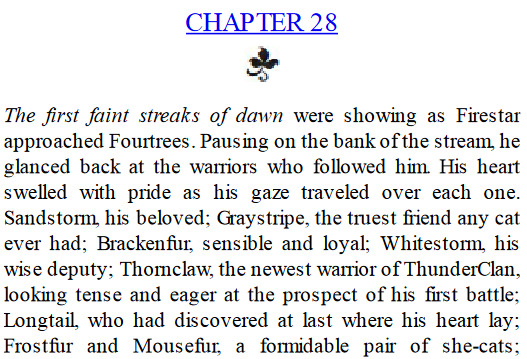
"Everyone who matters to me; my truest friend, my sensible and loyal warrior, the wisest deputy I've ever known, and 2 women." -Firestar, glorious idiot
He can't even think of a single trait for either of them what the hell does "formidable pair" mean lmaooo, when I finished a reread about a year ago this line killed me on impact.
#bone babble#cw misogyny#warrior cats analysis#SO good luck!! Absolutely ping me when you're done I wanna see lmao#Full disclosure I'm bad at responding to DMs because I open them and then forget#But I can try to answer your questions#Feel free to send questions in tho. You don't have to come off anon if you don't want i don't mind#I cannot stress enough. I'm just a guy who likes to yell about cats.
244 notes
·
View notes
Note
Thoghts on wonder women dead earth and Daniel Warren Johnson in general
It's such a weird story in retrospect. Great voice for Diana that will draw you in, only for you to see creative choices that totally are at odds with said voice.

First things first: the art is amazing. Daniel Warren Johnson is one of the best artists when it comes to fight scenes, he conveys a sense of motion and power that is downright cinematic. His designs for the world of Dead Earth, from Diana herself and the human survivors, to the mutated monsters, to the desolated post atomic wasteland, are all gorgeous. Absolutely adore his art for this book, if nothing else it was a treat to get four big issues of a Wonder Woman story with him drawing every issue. If you mainly read comics for the art, then this s definitely a Wonder Woman story that comes with a strong recommendation from me. Storywise however I can't give this a ringing endorsement, but some people are going to have a blast reading it.
I loved the first issue and really was riding the train that this was going to be a great standalone Wonder Woman recommendation for newcomers looking for a place to start reading her adventures. Here was the first major Wonder Woman story in a long time to use the classic made from clay origin, and it was the first Elseworld Wonder Woman story that I had read which didn't lean hard into the "warrior woman" characterization. Diana was kind, forgiving Dee for betraying her and telling Dee that she loved her and all people. When Cheetah wanted to kill Theyden, the leader of the last human city who forced Cheetah to fight people Theyden wanted dead in gladiator matches, Diana stepped in and stopped her. Despite Theyden having condemned her to death and wanting to rape her before that, Wonder Woman still refused to retaliate in kind.
We also got to see Diana in the leader of humanity role typically reserved for Batman or Superman. After saving the city of New Hope from an ambush of monsters, Wonder Woman rallies the people to go seek out Themyscria where she hopes they can find shelter. Inspiring the people to want better for themselves, and to be better than they are, leading them in combat against a massive Haedra, and giving them an example to follow. Far as characterization for Diana went this left me pleasantly surprised at how the narrative had avoided all of the usual pitfalls that typically plague Wonder Woman.
Then we got to the ending of the second issue.
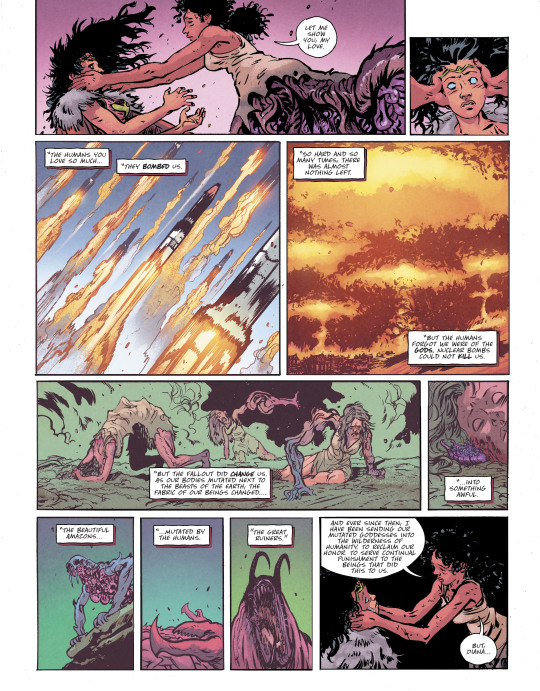
Another Wonder Woman story where the Amazons are the villains? When she has an entire Rogues Gallery just begging to be used? That was disappointing and strike one for me. But hey, as disappointing as it was I wasn't ready to write the whole book off yet. Diana bails on the people she led, leaving them for dead, and heads to the Fortress of Solitude to get answers about what happened to all of the other heroes, Superman in particular. There she discovers that she is the one who killed Superman, and not just him, but the entire fucking planet because she destroyed the world while fighting him.
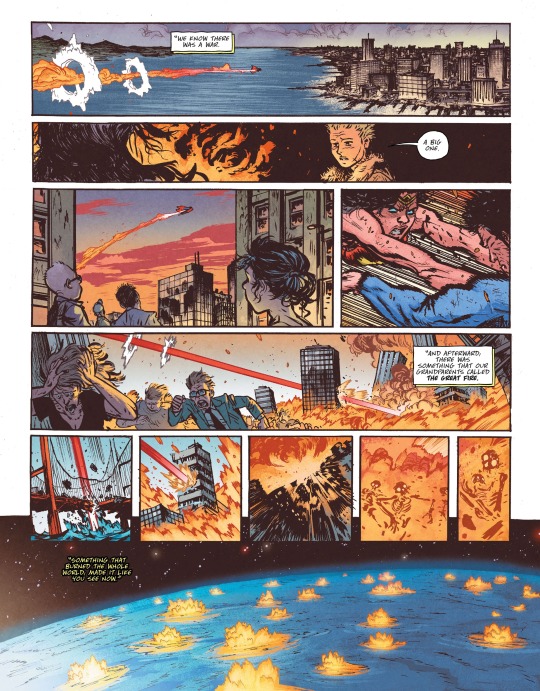
That was strike two for me. Now Dead Earth Wonder Woman was in the same boat as many other Elseworld Wonder Women where she had committed massive atrocities that were borderline unforgivable. How the hell do you come back from something like this? This wasn't what I wanted, but alright I told myself, Diana was sincerely repentant when Dee tracked her down and used the lasso on Diana to get the truth out of her. Maybe DWJ could wrap this story up in a way that while not exonerating her, managed to end in a place where I could buy that redemption was possible. Perhaps this was ultimately a story that while showing Diana's flaws also set out to show the value of her ideals.
And then...

Some people found this moment totally badass and absolutely love it, that's why I mentioned at the start some readers are going to have a blast, because this book is batshit insane. No other way to describe a story where Diana turns the spine and skull of Superman whom she beat to death into a fucking flail, and we are clearly meant to read this and go "YAAAASS QUEEEENNNN". My reaction was to stare in utter shock and disbelief at what I was reading, I was not even angry or upset, merely stupefied. Scott Snyder tried hard to capture that 90s metal energy and DWJ totally upstaged him, which you're either going to love or hate. For me this was strike three, this wasn't badass, this felt wrong. Deeply, deeply wrong and totally out of character for Wonder Woman, she desecrates Superman's corpse!
After that I just checked out and enjoyed the pretty pictures in the final issue showing Wonder Woman using Superman's skull and spine to slaughter her evil Amazon sisters. It kills me that DWJ has such a great voice for Diana, but the plot just ruins it for me. I can't enjoy this version of Wonder Woman. If you only care about the art and Diana being a badass who talks about love while killing everything in her way, then go give this a try. Otherwise there's better Wonder Woman stories out there that I'd recommend over Dead Earth.
12 notes
·
View notes
Text
AMERICAN HORROR STORY REACTION
This reaction is for season 11, second episode "Thank You for Your Service" which originally aired on October 19, 2022. The episode was written by Ned Martel, Charlie Carver, and Manny Coto and directed by Max Winkler. Spoilers ahead!
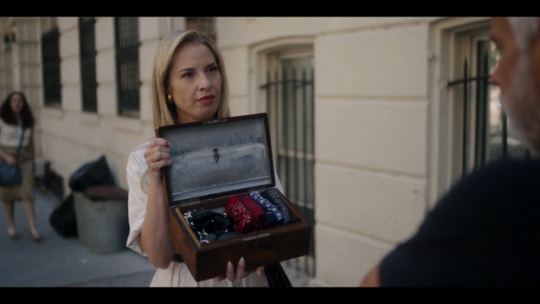
THANK YOU FOR YOUR SERVICE ...
I know I'm a wee bit late with this reaction but I wanted to share my thoughts about "Thank You for Your Service" before I jump into episodes three and four. Things pick up right where they left off in the previous episode. Gino Barelli (Joe Mantello) regains consciousness and discovers he is bound and gagged in an unfamiliar room. It should be noted that a dark book handkerchief is used to gag Gino. His captor uses a hypodermic needle to inject something into his fingernail beds, which made me squirm, but when he sees the United States Marine Corps tattoo on Gino's chest, he thanks Gino for his service and tells him that he's sacrificed enough. Rather than continue with his planned butchery, he sedates Gino, again, and the next time Gino comes to, he is in a booth at an adult arcade. Gino stumbles out of the place and collapses on the sidewalk. We then get our title sequence.
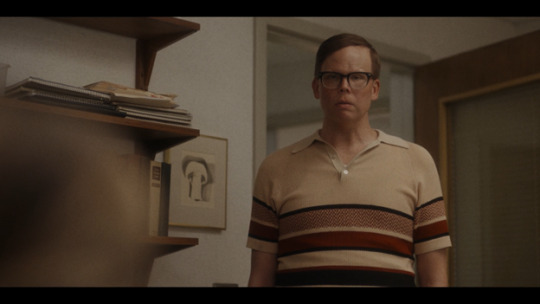
We hop over to the office of Dr. Hannah Wells (Billie Lourd). Her patients include Sam (Zachary Quinto), KK (Clara McGregor), and a guy named Mr. Whitley (Jeff Hiller) who looks exactly like the guy who kidnapped Gino and held him captive. Hannah tells Sam that he has a sexually transmitted disease she's recognized in four other patients and recommends he takes medicine, rest for three days, and abstain from having sex. When it's Whitely's turn to see Hannah, he tells her he has a persistent rash, the same persistent rash the other patients have.
Adam Carpenter (Charlie Carver) goes to see Gino at the Native. Gino recounts his abduction and torture as well as his attempt to file a report with the police department. Perhaps the most heartbreaking part of Gino's story is how Patrick (Rusell Tovey) pretended to not know him when he saw him at the police station. I get that it's not safe for Patrick to be out at work, but it's still pretty shitty that he turned his back on his partner in his hour of need.
Never one to be deterred, Gino writes in great detail about his capture. Adam suggests establishing a hotline where gay men can report information anonymously without fear of retaliation from the police. Gino ends up hiring Adam and the younger man starts placing flyers with the hotline number up around the city. It doesn't take long for the phone calls to start rolling in.
Adam gets brought into the police station where he is interrogated by Patrick, Detective Mulchahey (Brian Ray Norris) and Mac Marzara (Kal Penn) in regard to the Gino's article which features the interview he gave to Gino at the Native. They demand he retract the interview because it shines a negative light on the police but he refuses. Adam is put in a holding cell as punishment and Patrick goes to talk to him. He tells Adam that he will be released. Adam asks if any of the other police officers know that Patrick's gay but Patrick avoids the question. He gives Adam his business card and tells him to call him if he sees anything out of the ordinary. He lets Adam know that he does care about everything that's going on and that he is quietly investigating the murders.
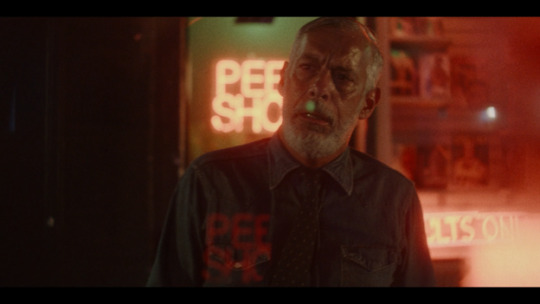
Gino and Patrick's ex-wife, Barbara Read (Leslie Grossman) run into each other on the street. She gives him a small, wooden box she found in storage and tells him it belongs to Patrick. The contents of the box include poppers, some bondage gear, and handkerchiefs. Barbara tries to tell Gino that Patrick has been lying to them but he accuses her of being jealous. Gino stalks off but he is obviously rattled by the revelation.
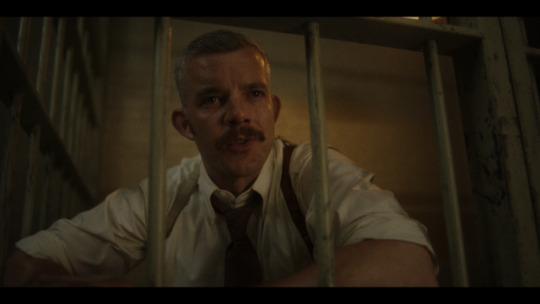
Meanwhile, Adam is released from the holding cell and he is picked up from the police station by his friend Morris (Kyle Beltran). I love the conversation between the two as Adam recounts his horrific experience with the NYPD. Morris reminds him that this sort of thing happens all the time to people of color, especially queer people of color, and that perhaps Adam has been able to turn a blind eye to the NYPD's mistreatment of their community because his white privilege shielded him from it. He then invites Adam to a warehouse party.
Back at Gino and Patrick's apartment, Gino is upset because the detective he talked to about his capture accused him of making it all up. He is upset at Patrick because he feels like he isn't doing enough to investigate. While I sympathize with both men, ultimately I'm on Gino's side. I get Patrick's initial reservation about taking interest in cases involving gay men but now it's personal. At some point he is going to have to choose between his job working for the NYPD and his relationship with Gino because in this particular social and political climate it's next to impossible for him to have both. Gino suggests the two of them go to a nearby leather bar to gain some intel.
We then see a young man named Stewart (Taylor Bloom) sitting at a bar. Someone sends over a Mai Tai but he declines the drink. He heads outside and hears a payphone ringing. The man on the other end of the line is Sam and he invites Stewart to come over to his place. Not to pass any judgment, but I must say, I do find it interesting that this guy is obviously savvy enough to decline drinks from strangers, but he's willing to show up to a complete and total stranger's house for sex. Very, very interesting.
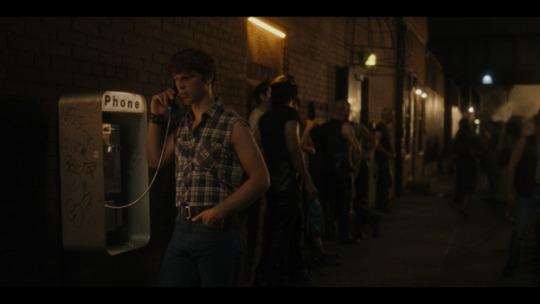
Adam and Morris go to a warehouse party which reminded me of a scene straight out of Velvet Goldmine. The master of ceremonies, a guy named Cameron (Gideon Glick), invites Morris onto the makeshift stage along with another performer named Hans (Casey Thomas Brown). It should be noted that Cameron is wearing a powdered wig and is looking very much like the Edward Mott character in "Roanoke". Cameron injects himself with an unknown drug and I must say, if "Hotel" didn't give me a phobia about needles, this season definitely will. Cameron recites some slam poetry and warns the audience that something's coming. He looks right at Adam as he says this which prompts Adam to leave the venue. Adam runs into Theo kissing another man and Theo follows him outside.
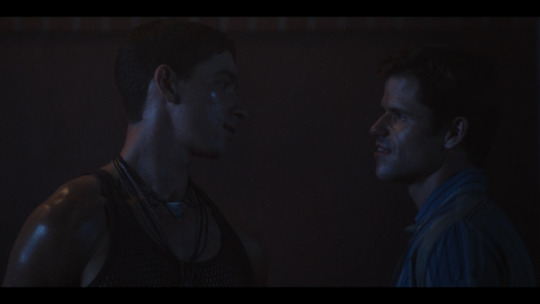
I really dug the conversation between Adam and Theo because I have been both of them at some point in my life. Adam wonders aloud why Theo goes from one man to the next when he is supposed to be in a relationship with Sam. Theo explains that for him, sex is biological. For him sex and love are mutually exclusive, and he can love Sam while seeking sexual satisfaction from other men. Adam counters this by asking Theo if he thinks he can do better. For Adam, sex and love aren't mutally exclusive. Theo hints at wanting to having sex with Adam, but Adam suggests they go somewhere to get something to eat, have a drink, and talk. I love that this interaction was included in the episode because the gay community, or rather the queer community, in general, has often been maligned as hypersexual, and while sexuality and sexual expression are an important part of the community, there are queer people who share Adam's philosophy. I don't think one perspective is particularly more valid than the other. I think both should exist, just as they do with straight people.
Meanwhile, Gino and Patrick arrive at a leather bar called The Ditch and they immediately split up. Gino goes to talk to the bar's manager, Alana (Rebecca Dayan). These two clearly have a friendship and mutual respect for each other. Alana asks Gino what he's writing about these days and he tells her he is reporting on the string of murders. Alana agrees that what's going on in their community is awful, she asks that he not mention the bar because the bar is owned by the mob and they wouldn't take kindly to be associated with the murders. Gino promises he will not mention The Ditch in any of his articles.
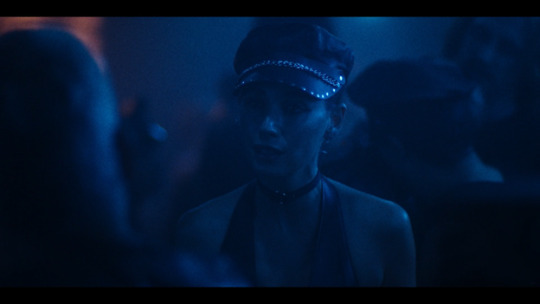
Patrick gets propositioned by the bar's bouncer but rebuffs his advances. The bouncer is sent a drink, a Mai Tai, and comments that it's an odd drink to be serving in such an establishment. He downs it without even thinking twice.
Gino and Patrick meet back up and sit at the bar. Gino tells Patrick about his run-in with his ex-wife, Barbara. He tells Patrick that he knows about his leather fetish. Patrick is frustrated that Barbara is getting involved in their relationship. Their argument is cut short when the bouncer is stabbed in the neck by Whitley who disappears into the shadows of the club. Whitley is getting bolder and bolder with his killings. Killing someone inside a crowded bar is kind of reckless but it's also kind of genius in a way because everyone seemed too preoccupied to notice what he was doing. Patrick goes into cop mode to access the situation while Gino looks on in horror.
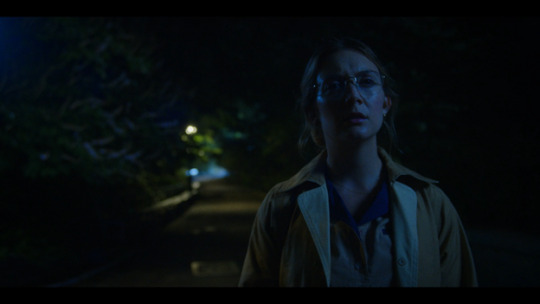
Later on that night, we see Hans, the performer from the warehouse party, walking home. We also see Big Daddy following him. We also see Dr. Hannah Wells at her office reviewing the lab work from her patient Whitely. She gets a phone call from Fran (Sandra Bernhard) who asks her to meet her in Central Park. Fran tells Hannah she has information about her patients and the deer on Fire Island. Hannah heads over to Central Park, at night, and is accosted by a leather-clad man wielding a chain. He chases Hannah but she ends up running into Fran. When she tries to show Fran where the man was, there is nothing to be found. Fran tells Hannah that the disease she is studying was deployed by the government as a way of attacking the most vulnerable populations in the city.
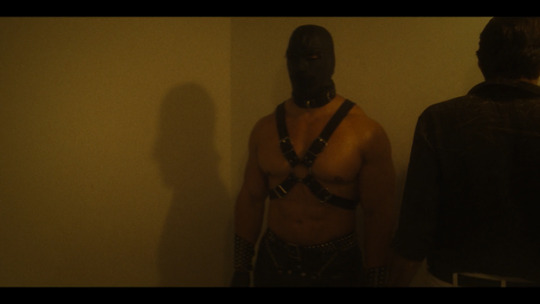
We see Sam return to his apartment. Big Daddy is standing outside his door but he walks by as if he doesn't see him. We then see that Sam is holding Stewart captive in a cage. Stewart asks to leave but Sam decides to keep him locked up. I'd like to take a moment to say I don't think Sam is the one reponsible for the murders. I do think he's quite sadistic and something tells me he's going to get his comeuppance by the end of this season.
The next morning, Patrick and Gino talk about the murder at The Ditch. Gino laments that once again, a gay man is murdered and the police aren't doing anything about it. Patrick tells Gino there weren't any drugs in the drink the bouncer drank before he was killed, but Gino thinks Patrick is holding something back. Patrick gets a call and heads over to yet another crime scene. Marzara points out six severed hands, each of them belonging to six victims. That's where we end the episode.
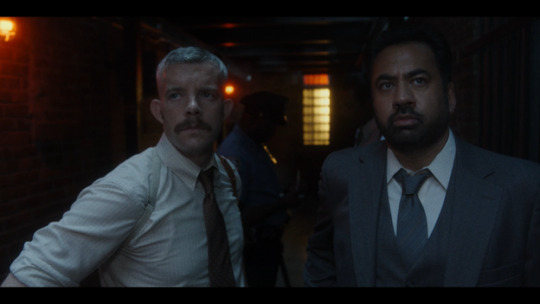
I really love this episode. I can't say this enough - the characters this season feel very grounded and it's hard to believe that someone like Gino Barelli exists in the same universe as Myrtle Snow (Frances Conroy) or Madison Montgomery (Emma Roberts). This season is very, very dark, but we've had dark seasons before. "Roanoke" and "Asylum" and "Murder House" were very dark seasons. So was "Cult". But there was always a borderline cartoonish element to those seasons as well, like the clowns in "Cult" or the "Name Game" sequence in "Asylum" or the general campiness of the reality show characters in "Roanoke". There isn't a whimsy or campy element to the season, at least not yet. It feels very gritty. It feels like prestige television which is something I've never said about any of Ryan Murphy's shows. Some folks have even commented that this season, so far, doesn't even feel like American Horror Story. I don't see that as a bad thing though. Last season, as a whole, was pretty much a dud. This season feels like an overcorrection of that and I think that's a great thing. American Horror Story is one of those shows that feels like it could be on for many years, like Grey's Anatomy or NCIS. These two episodes - "Something's Coming" and "Thank You for Your Service" - make me feel like if this season manages to stick the landing, maybe we can get to season 20. I guess we have to see how things continue. Until next time ...
#tv reaction#blw reactions#american horror story#ahs nyc#ahs season 11#adam carpenter#gino barelli#patrick read#barbara read#theo graves#hannah wells#billie lourd#russell tovey#joe mantello#charlie carver#isaac powell#kal penn#leslie grossman#sandra bernhard#rebecca dayan
6 notes
·
View notes
Text
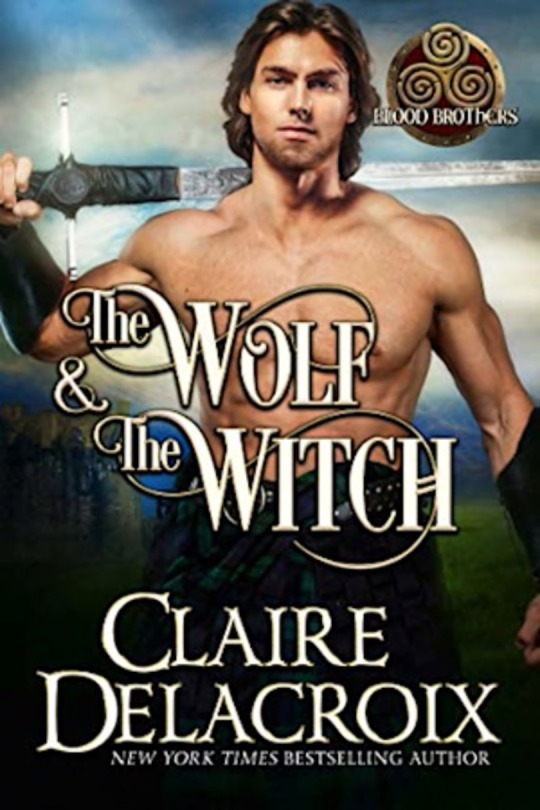
The Wolf and the Witch
By Claire Delacroix
Series: Blood Brothers, Book #1
Publisher: Deborah A. Cooke
Kilderrick, Scotland
Samhain, 1375
October 31/ November 1st
Maximilian de Vries also known as the Silver Wolf, whose legacy was stolen from him all because his father was rotten to the core and had forced himself on his mother. Everyone hated his mercenary father, but still he should not of had his legacy stolen from him. He found out he his two cousins were really his half brothers and all had the same father and have a ruined keep in Scotland.
This keep that had been promised to him is being held by women claiming falsely they are witches. The leader of the women is Alys Armstrong who is the dead Lairds heiress his daughter , one woman brave enough to reject him but Maximilian has tried to make resolutions and compromises but she refuses at every turn . So the last result must be marriage no matter if she likes it or not they would be wed!
This spit fire Lass is out for retaliation no matter what and has a wrath that seems to be equal to Maximilian’s own rage! Alys Armstrong feels this man has stolen everything from her and will never agree to any of his suggestions. So it comes down to the battle of the sexes. Now who will win. Yes soon they have no choice but to join sides as Kilderrick is in jeopardy. Plus the passion between the two of them cannot be denied. So who will win Maximilian or Alys?
Will they both lose this keep they love or will these two enemies soon realize there is a thin line between love and hate. Which will it be? Read and find out.
Another phenomenal Claire Delacroix book that I absolutely loved. It is filled with so many twists and turns I was holding on to the edge of my seat. Both Maximilian and Alys are strong, brave and protective. He is swoon worthy and she is a beauty with brains! I absolutely devoured this book from start to finish. So a dazzling start to another brilliant Claire Delacroix novel. Been reading her books for over two decades so I really wasn’t surprised as she always sweeps me into her brilliant stories!
This is a book I highly recommend and I know all historical romance readers will absolutely love it.
Book Buy Links
https://www.amazon.com/Wolf-Witch-Blood-Brothers-Book-ebook/dp/B08B3YW445
https://www.barnesandnoble.com/w/the-wolf-the-witch-claire-delacroix/1137386663
https://books.apple.com/us/book/the-wolf-the-witch/id1518237967
https://www.kobo.com/us/en/search?query=The+Wolf+and+the+witch+by+Claire+Delacroix+
0 notes
Text
Stranger Places (a stranger things tale) chapter five: Therapy
Description: Everything changes when Dustin finds his mother’s lifeless body, but he is quickly reminded that he still has family when his older sister comes home. Though she is not the company he wants, can he learn to live with her? Can she readjust to life in Hawkins?

keep reading
Jackie was dead silent the entire car ride. It was a trait both her and Dustin shared; when they were upset about something, they would refuse to talk or listen to anything anyone had to say. Steve felt anxious from the energy being created. He knew he probably should stay quiet and mind his own business, but his curiosity was getting the better of him.
“So,” he began. “Wanna talk about it?”
“We don’t need to discuss how Carol, Nicole, and Beverly are airheads,” She said, without missing a beat. He let out an awkward chuckle. “Why’d you let them get to you then?”
“It wasn’t just that,” Jackie replied. Without taking his eyes completely off the road, he glanced over at her. She hadn’t moved or switched her position since they got into the car; her arms still crossed, the same curl caressing her cheek, and her eyes locked on the ever changing scenery as they passed through town. “So what else hap-”
“Listen, Steve,” she said finally turning her head to look at him. “I get what you’re doing and I appreciate it, but I’m really not in the mood to talk about it.”
He began to say something else, but decided it wasn’t worth really saying. If she wanted to sit in silence, he’d just have to deal with it.
When they did arrive to the Henderson house, Jackie sat there for a second. Her eyes fell onto the numbers above the garage door. They were rusted and the number two was crooked; the same ones from when they first moved in. Another thing her dad always promised he would fix, but never did. She hated that she was allowing him to even slip into her brain, because he had no place in her life, not even in her thoughts.
“Jackie,” Steve broke her from her trance. “I do have to get back to school.”
“Yeah,” she said, remembering he was skipping.
“Thanks” She told him, unbuckling her seat belt.
“Jackie?” he stopped her, before she could get out. She looked at him with tired eyes. He better make this one quick he told himself. “Give it some time. Things will get better and people will change.”
She rolled her eyes and smirked. “People don’t change, Harrington. At least, not in this town.” She opened the car door and hopped out, closing it behind her. Jackie sped walk to the front door. She fished around for the spare key in the giant pot on the porch, since she forgot hers in her locker with her coat, and let herself in.
Dustin sat in the guidance office directly across from his designated counselor, Mrs. Gonzales; who sat there patiently with a smile on her face and hands folded together on top of her desk. Dustin smiled back at her nervously. He notices the Newton’s cradle sitting on her desk and reaches for it.
“Oh, please don’t touch that,” she tells him, reaching out her hand to stop him.
“Why have it on your desk then?” he asked her. Mrs.Gonzales smiled, as if to see his point. “Dustin how are you feeling?”
He looked at her like he couldn’t tell if she was being serious. “Okay,” he said, dragging out the a and y.
“Dustin,” she began. “You’ve just been through a tragedy. Its okay to not feel okay.”
His eyes darted from one side to the room to the other. “Okay,” he repeated the same way. She was being serious.
“Is there anything you want to talk about?”
“Not really,” he said. Anything he did want to say, he didn’t want to discuss with her.
She closed her eyes and smiled. “That’s okay, you don’t have to say anything to me now. But I would like to start seeing you once a week, every Monday, at this time.”
Dustin slumped back into his chair. Another reason to hate Mondays. Mrs. Gonzales scribbled down a hall pass for him before dismissing him. Dustin started the destination back to class, but came to a hault mid-stride. He looked over to his right into the windows of the library. He backtracked to the entrance, searching for an empty table to make himself comfortable at. Dustin unzipped his back pack and pulled out the book Mr. Clarke had given him. He flipped pass the first few header pages and started at chapter one.
“So you’re interested in learning about energy and its correlation with the afterlife? Let me start off by telling you this book is not a guide on how to resurrect yourself or a step by step how to bring back a deceased loved one from the grave (I recommend studying witchcraft if you’re truly interested). It is simply my theory of how the energy our bodies produce and use while we are alive is recycled after we die, and how we could possibly use this said energy to our advantage while we are still kicking and screaming.”
Mr. Clarke knew exactly how to get Dustin’s attention. He was only a paragraph in and already intrigued. He continued.
“First of all, lets define what energy is. Energy (symbol: E) is the property of matter, usually created by the vibration of molecules interacting with one another, that propels an object. Energy can be created physically or chemically, but can not be destroyed. So what does that mean for us? Our energy is both physical and chemical. We can create it from sleeping, eating, exercising, etc. However, besides just allowing us to move, think, and talk which is incredible in itself, energy can allow us to do so much more than what we are already aware of; such as telekinesis, telepathy, teleportation, even time travel. But, we’ll get more in depth with that in chapter seven.”
“Cool,” Dustin said, continuing to paddle his way through the voyage of knowledge.
Steve made it back to campus just in time for practice. He changed into his Hawkins High t-shirt and gym shorts and got out on the court, stretching his arms and legs out before practice actually began.
“So, did you here orphan Annie’s alive?” he heard one of his teammates say.
“Yeah, wild right? She’s actually sorta cute now too,” another one chimed in. Steve rolled his eyes. Jackie was probably getting this all day. No wonder she wanted to leave.
“Is she that sexy little curly haired brunette I’ve been eyeing all day?” Steve clenched his jaw. Billy knew exactly how to get under his skin, even when he wasn’t trying.
“Don’t waste your time on her, Billy,” Tommy told him. “She was sick back in middle school; had to be moved to a special hospital for it. Don’t wanna catch something from her.”
“She had cancer, you idiot,” Peter, one of their teammates corrected him. “You can’t catch cancer.”
“Still,” Tommy continued. “She’s not normal. She’s a crazy one.”
Billy smirked. “Well, good thing I like ‘em crazy.”
“Fat chance.”
“How much you wanna bet I can get in her pants before the end of this month?” Billy egged on.
“I bet fifty bucks you won’t,” Peter told him.
“Same,” Tommy said.
“You’re on,” Billy told them with a ghoulish grin. “Get ready to lose your allowances, boys.”
Steve’s hand clenched up into a fist. Jackie didn’t deserve this type of ridicule, or to already be preyed on by Hargrove. But before he could act on his emotions, coach blew his whistle.
“Stop gossiping boys. You can do that at your sleepover when you all are painting eachother’s nails and watching pretty in pink. Thomas, off my court.”
Peter came over and gave Steve a light slap on the back. “You good?”
“Yeah,” Steve replied and join the rest of the team to do drills.
Jackie sat on the couch staring at the clock. She thought she wanted to be alone. She really didn’t like the silence though, leaving her to get tangled in a web of her own thoughts. She sighed, getting up to look for a spare coat around the house. When she didn’t find one in her own closet, she went to Dustin’s, where she found an oversize wool sweater. This should do the trick, she thought as she pulled it over her head. She grabbed a scarf and hat as well, knowing very well Dustin never wore it if he was willing to leave it behind.
Jackie locked the front door behind her, placing the spare key back where it belonged. She needed to find a way to blow off steam. She knew the exact activity to help her do just that too and hopped on a bus into town. Plugging herself into her walkman, she avoided any possible human interaction with anyone else riding the bus. Thankfully, the trip wasn’t long and she was off within fifteen minutes, heading to the towns training center.
When she entered the gym, Jackie walked straight up to the counter, pretending not to notice that she was the only female there and all the men were staring at her. She rang the bell and a man peaked his head from behind his newspaper. He was big, rugged and intimidating, but Jackie didn’t even flinch at him.
“Are you lost?” He asked her in his deep voice.
“I want to sign up for your kick boxing classes,” she told the man, who raised a brow at her. A few of the men let out a few chuckles her way that she brushed off with ease.
“Sorry, but no.”
“Why not?” she insisted.
“I don’t have someone who could train you.”
“Then you train me,” she retaliated with.
He folded up his paper, setting it to the side. “What makes you think I want to train you.”
“Because,” she began, glancing around the room. Apparently she was the center of entertainment. They were really gonna love this one then. “Because I’m better than any guy you have here.”
There were a few whoops from the men in the gym.
“Little girl, this is a professional gym,” he explained to her, as if she was blind and didn’t know where she was.
“And I’m a professional,” she replied back
“Why don’t you sign up for the cheer squad?” he asked her, patronizingly.
“Because I don’t break nails, I break bones.”
He smiled at her and let out a slight chuckle underneath his breath. “You really want to train that bad? Fine, glove up. Lets see what you’re made of, big shot.”
She smiled and quickly headed over to get sized up for gloves. The young man behind the second counter, who didn’t look too much younger than her smiled. “What size?” he asked.
“twelve ounce.”
He seemed impressed by that alone that she knew her own sizing. He shrugged and handed them to her. “Knock ‘em dead.”
She giggled, braiding her curls. He was the first person not from her past that was actually pleasant towards her. “Thanks.”
Jackie made her way to the ring, where the man from the counter was waiting. He looked at her and let out a big exhale.
“Ready?” she asked him.
He rolled his eyes and put up his guards. “Okay, give me a left, then a right straight.”
Boom! Pow! She knocked her gloves into the padded guards.
“Good,” he praised her. “Now give me a right hook and a left uppercut.”
Pow! Pow! Again, she punched into the guards, making gun-pop like sounds. The man looked at her with amazement. She was disappointed that he found this impressive.
“Come on,” she egged him. “You’ve got anything more challenging? Give me some combos!”
He laughed. “Alright, kid. Throw a 1-2-1-1, then a 1-6-3-2 combo.”
She did them with ease. This went on for the next fifteen minutes. Him throwing combos at her left and right, more difficult as they went on, and her doing them with no hesitation. She could feel herself disappearing, forgetting all about the day and letting her frustration out on the activity at hand.
“Okay, lets stop,” he told her. Jackie frowned. “no,” she said breathless. “Why?”
He laughed. “Because my hands are beaten up and tired,” he said honestly. He threw her a towel. “Come on, kid. Lets go get you a water. You deserve it.”
She smiled, following close behind him with the whole gym in awe of her.
“What’s your name?” he asked, tossing her a water bottle.
“Jackie,” she told him.
“Nice to meet you, Jack. Brodie,” he told her, extending out a hand that she took graciously. “Where’d you learn all that, Jack?”
“Someone told me that it was good for a girl to know a form of self defense,” she began. “I thought it would be better to know how to throw a good punch.”
Brodie chuckled. “Well, you definitely know how to do that.” Jackie smiled, taking a swig from her water. “You’re right. I don’t think any of these pansies here can hold a candle to your lightning.”
She giggled, dabbing her forehead with the towel. “Classes are $30 a pop,” He began but before he could get in another word, her smile disappeared. “I’m sorry Brodie, but I can’t afford that. I have to take care of my kid brother and pay bills. That’s just too expensive for me at the moment,” she apologized, handing back the towel. “I’m sorry for wasting your time.”
He shook his head at her. “Wait, before you get hot and bothered by the price, I can negotiate with you. I’m not that much of an unreasonable man,” he said with a smile. “how to does $30 a month sound? instead of a class?”
“I can’t ask you to do that,” she said in awe.
“I’m not asking, I’m offering. I want you to train at my gym. You’re good kid, and you know it. Which means you’re not afraid to give it all you got. You just need someone to do the fine tweakin’.”
She smiled, “Thanks, Brodie.”
He ruffled her hair like he did with his boys after a good training sesh. “Be here nine am, saturday, in appropriate attire this time. Not like you’re going to chop wood.”
She giggled. She did look ridiculous in her outfit from school in a hot gym. Brodie disappeared into the back room, and Jackie went to return the gloves she had borrowed. The young man who helped her before gave her a small applause. “You didn’t just knock ‘em dead. You murdered them.”
She laughed, “I guess I took your advice a little too seriously.”
He extended his hand out, “Corey.”
“Jackie,” she introduced herself. “Do you train here too?”
He laughed. “As if. I just work here. I think my dad thinks it’ll make me less gay,” he told her.
“He sounds like a prick,” she mumbled.
He laughed again. “Well, he seemed to take quite the liking to you.”
Her eyes widened as she cursed herself.
“Don’t worry. I don’t think he heard you from back there.”
“Brodie’s your dad?” she whispered.
“Yeah,” he said with a sigh. “He’s a bit of a hard ass, but the man really does have a heart of gold.”
She thought it was kinda sweet how Corey described Brodie, and wished she could say the same for her old man.
“Well, anyway,” he began. “I better get back to work before one of these meatheads tell on me.”
She laughed. “Thanks Corey.”
“Later Gator,” he told her as she exited the gym.
Hey you! Thanks for reading. I’m trying to move things along so that I can possibly start posting more frequently. Just hitting little roadblocks, but we’re still moving! Feel free to like, leave a comment, or message me :)
#stranger things#netflix#mike wheeler#will byers#lucas sinclair#dustin henderson#nancy wheeler#stever harrington#joyce byers#jonathan byers#eleven#jane hopper#chief hopper#jim hopper#billy hargrove#max mayfield#millie bobby brown#gaten matarazzo#finn wolfhard#caleb mclaughlin#winona ryder#noah schnapp#david harbour#natalia dior#charlie heaton#joe keery#dacre montgomery#sadie sink#stranger things fanfiction#stranger things fanfic
4 notes
·
View notes
Photo
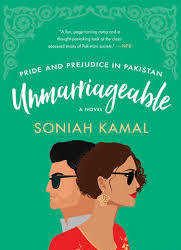
Unmarriageable by Soniah Kamal
2.5 Stars
Review under the cut
Review: I definitely have some Thoughts on this book. I enjoyed it, but I can't really give it any undying love either. I will go ahead and start with the things I did like about the book. I don't know much about Pakistani culture circa 2000, but it did seem like a good setting for a P&P retelling because of the cultural importance of marriage and class. One of my favorite comments was Jena's "we don't have the kind of money that can buy miracles." She was ridiculously good at writing Farhat Kaleen's (Mr. Collins) point of view. Really managed to capture the subtle misogyny and ego that he had: "Alysba was lucky that he was not the sort of man who'd respond to her insult of a refusal by throwing acid on her. In fact, he was firmly against such retaliations." I also particularly enjoyed the moment where they are talking about pride and prejudice and Hammy (Caroline Bingley) says her favorite part is with Darcy's wet shirt and insists she could "read that scene all day." And, of course, the storyline between Alys and Darsee was pretty strong. In fact, their scenes were some of the strongest of the book. I thought she did a good job of showing that they had things in common from the beginning, and it was only their stubbornness and pride keeping them from not getting along. However, the romance and the little moments I enjoyed were not enough to carry the entire book, which is where I get into the things I didn't like.
Thing that doesn't bother me: how close the character names are to the original characters
Thing that also doesn't bother me: the fact that pride and prejudice exists and is discussed, and it doesn't take place in an alternate universe where P&P doesn't exist
Thing that does bother me: Not once do any of the characters, not even in the epilogue which is when I was waiting for it, note just how similar their situation is to P&P
A lot of the writing was pretty clunky. There was lots of descriptions of food, clothes, etc, but reading the descriptions often felt like simply reading a list. They didn't really immerse me in the scene the way they should have. And in general, I feel like I could have used more showing and less telling. The "what will people say" at the end and the epilogue were both awkward. The epilogue literally felt like a "let's catch up with everyone real quick so you know what happened to them one year later" and less a natural extension of the story. And finally, Alys's character. Her feminism too often came off as "I'm not like other girls." And she basically never stood up for Quitty or Mary. Lady is constantly making fun of both of them and true feminism would be helping her sisters by saying there's nothing wrong with being fat and being fat doesn't undermine anyone's self worth. Or by saying that all people, especially all women, should be able to practice whatever religion they like and we should be tolerable of other people's belief. But I can't remember her ever doing this.
Conclusion: there were parts that I liked, but those parts weren't strong enough to carry the whole story. I liked it enough to not DNF, but I also wouldn't necessarily recommend it to anyone.
0 notes
Text
Book Report: Simon versus the Homo Sapiens Agenda
Book Form Name: Renz Alden Gaid Title: Simon versus the Homo Sapiens Agenda Author: Becky Albertalli Copyright: April 7, 2015 Date Submitted: March 15, 2019 Plot: Simon Spier is a 16 year old junior high school student who almost jas a perfect life. He have a loving parents, sweet little sister and three best friends, Abby, Nick and Leah. However, Simon is hiding the fact that he's a gay. One day, he learn through his school confession website that there is one another gay at Georgia High School. The two begin chatting each other under codenames, the mystery guy is Blue, and Simon goes by Jacques. Simon finds himself falling in love with Blue, who shares his love for Oreos and his fear for coming out, but Blue refuse to reveal himself. Martin, one of the classmates of Simon, stumbies upon this e-mail communications and uses them to blackmail Simon into helping him to get a date with Simon's friend Abby. Simon agreed in order to protect Blue, inviting Martin to hang out with his friends even when they don't get along. Abby is not interested, as she is falling for Nick, Leah however seems to be falling for Simon. As time passes, Simon wonders about who Blue could be. He is suspecting boys like Cal Price the stage manager of the school play, soccet player Bram Greenfeld, and evwn Martin playing a cruel trick. The group goes to a Halloween party and facing the wrath of Simons parents when they come home drunk. Simon comes out to Abby and is relieved when she takes Simon well. Things went wrong when Simon and Martin argue, and Martin retaliates by outing him to the school confession site. Simon becomes the subject of harsh bullying, and Leah and Nick turn on him, felling betrayed that he did not tell them. He comes out to his parents, who thankfully accepted him. After the last performance of the school musical, Simon goes to the carnival and waits for Blue on the Tilt-A-Whirl. Then Bran Greenfeld the cute soccer player who he thought was interested of Leah showed up. The two rode the ride together and decided to date the next day at school. Simon reconciles with his friends and they become five. Setting: Shady Creek High School Characters: Simon Spier- he is the main character of the book and the adaption, Love, Simon. He is a closet gay, he starts a relationship through online with another gay in school who goes by the name Blue. Simons real identity was exposed when one of his e-mail ends up in wrong hands. He needs to face his sexuality and the consequences of coming out. Bram Greenfeld- he is a quiet person who sits on Simon lunch table. Simon describes Bram as actual kind of adorable with expressive brown eyes and curls. Bram considers his self very funny inside of his head, despite of being shy. Martin Addison- he is a student at Shady Creek High School. He is also known as the classroom clown. After seong Simons e-mails from a school computer and using them to blackmail Simon to be his wingman for Abby. Abby Suso- she has a very bubbly personality. She is outgoing, sporty, smart popular, a cheerleader and sweet to everyone. After moving from D.C. after her parents divorce, she became friends with Simon, Abby and Nick. Conclusion: The novel “Simon versus the Homo Sapiens Agenda is a beautiful and exciting story for me. It talks about love, friendship and acceptance. In each chapter you will not be bored because of the excitement it brings in every chapter. You will learn many things. It inspires us to be ourselves and to be out and proud. Evaluation: I like how the author wrote her nobel because she has a unique style of writing. The novel she wrote was never been boring for me because in every chapter is exciting and interesting to read. It is different from other books. Recommendation: I recommend this story to my friend or to everyone because I want them to learn all the lessons I have learned from this story. I want to share it to them. You will learn different lessons in life. Moral Lesson? The moral lessons I have learned is to accept, value friendship and don’t be afraid to love. Be yourself, never be afraid to show everyone who you really are, what matters is you are happy as long as you are not hurting or stepping someones personality. If you will be out, you will be happy because you are truly free, you will be finally happy. Love is not based on gender. Love may be boring and quiet sometimes but it is sure. Whats important is what is inside you and that is the thing you need to be true.
0 notes
Text
DL: Week 5— Big Answers in The Lovely Bones (Task 1)
Lilanie Montoya
This book contains topics relating to rape, murder and sexual predation. Would you recommend it to teens as a way to gain awareness of these issues or is it better for a more mature audience because these issues are too frightening and traumatic? Is it necessary for there to be a trigger-warning beforehand?
The Lovely Bones revolves around the death of a young girl named Susie, who is raped and murdered by one of her neighbours. In my opinion, this novel is a good source to bring awareness to teens about this topic. Even though it's frightening to think about, these things can happen to anyone at any age, not just adults. It is understandable that some parents may feel as though this novel may be too gruesome and traumatizing for their child but, this issue isn’t a fairy tale but rather a reality that happens in the world today. If parents continue to force ignorance on their children by painting a perfect world for them to live in, it’ll be hard for them to recognize that things like rape and murder can happen to kids in real life. People, especially teens need to be aware of that. As kids, we are also very gullible and easy to take control of just as Susie had been in the novel. It sets an example of how one should be aware and not too trusting to everybody. I don’t agree with people forcing teens to read this novel but, I think the readers should choose for themselves if they are ready to read The Lovely Bones. This novel also doesn’t romanticize this topic like some books do which sets a good example because these cases are horrible and the novel doesn’t fail to showcase the horror of them. The Lovely Bones is also a good way for people who may have been victims or have known someone who has been affected by this subject. In the novel, Susie was able to meet other victims who’ve been killed by George Harvey. She had explained how she felt after sharing her story by stating, “Each time I told my story, I lost a bit, the smallest drop of pain. It was that day that I knew I wanted to tell the story of my family. Because horror on Earth is real and it is everyday. It is like a flower or like the sun; it cannot be contained.” (pg 186) I believe this novel can help bring peace to people who have suffered or even refuse to seek help. In The Lovely Bones, Susie exhibits how sharing her story helped her come closer to healing and getting rid of the pain she felt emotionally. This scene can help encourage people to share their stories or seek help if needed. In another scene of the novel, Mr Harvey (the serial killer) recollects his first time harming someone. It was when he had raped a girl from her school. When he came home that day he said, “But his father didn’t ask, and no one came around for him. No father or brother or policeman.” This is another issue that has recently taken into light. The Me Too Movement is a movement against sexual harassment and sexual assault of women. There have been many cases of rape that have been kept in the dark for years because women have felt embarrassed or afraid to speak out about them. This novel showcases characters who fight to protect women such as Susie, Ruth and Len. This also sets a good example because it empowers women to recognize that they are not alone in this battle. I also think there should be a trigger warning because the novel can get quite descriptive in the beginning. I think it's just a good precaution to take because it can possibly bring back memories for some readers who may have not fully healed from their own traumas.
Is it worth it to seek revenge on someone who has harmed you or one of your loved ones?
No, in my opinion it is not worth it to seek revenge on someone who has harmed you or one of your loved ones. Even if you strongly believe that taking revenge will make you feel better, it’s highly likely that you’ll end up feeling disappointed or unsatisfied with your outcome. For example, after Susie’s death, some of her family and friends grew angry and wanted to seek vengeance. Susie’s father, Jack tries to figure out who murdered his daughter, thus resulting in his suspicions of Mr. Harvey. In a conversation with Mrs. Singh, she supports his suspicion and feeds him an idea on what she would do if it were her in his position. She states, “When I was sure, I would find a quiet way, and I would kill him.” (pg 127) This piece of advice caused his ambitions to retaliate to flare which didn’t turn out well because one night, Jack had seen a light at the cornfield. Driven by anger, he goes to take “revenge” on who he assumed was Mr. Harvey but instead it was some of Susie’s friends and Jack ended up in the hospital. This example from the novel shows us how taking revenge isn’t worth it. Jack had been driven by hate and anger which caused him to act impulsively. His plan not only backfired on his behalf by getting hurt but the situation could’ve taken a turn if he had also seriously harmed Susie’s friends. If that had happened, he would have been in the same position as Susie’s murderer. My family has personally experienced a situation where one of our relatives has passed away because of an incident caused by fault of someone else. In all honesty, we used to feel like taking revenge on this person would’ve been great but at the end of the day, seeking revenge won’t be able to bring back the life that was lost. In situations like this, forgiving the person who has harmed you and your family is extremely tough. After years, hate might build up but there is also the possibility of letting go of the situation and learning to live with the event. Even if losing someone hurts, your family and friends wouldn’t want you to keep holding onto hate in your heart.
Are events within a person’s childhood the cause for its habits and tendencies in its future?
I do believe that events that happen within a person’s childhood plays a significant factor to its tendencies and habits in their future. Children are like sponges when it comes to absorbing knowledge and a child's upbringing and personal experiences mold their personality too. Depending on their surroundings, a child has the possibility of continuing along the same path that they’ve been given because of past traumas. In The Lovely Bones, it is revealed to us that Susie had not been the only victim of Mr. Harvey’s. The readers are able to see parts of his childhood that shaped him into his tendencies as an adult. During Mr. Harvey's childhood his mother teaches him how to shoplift and rob victims of roadside fatalities at a very young age. The novel describes him to have “scavenger’s eyes” which he possesses after being taught by his mother to “look past the dead” (pg 188) during a trip to a roadside fatality memorial. This habit as a child never broke since we see that after he kills one of his victims, he steals one of their items as a token of his act. He often marvels over these objects similar to how a scavenger would. Another event from Mr. Harvey’s childhood had been when his father abandons Mr. Harvey’s mother in Truth and Consequences, Mexico. In the novel, we see that this event has greatly affected him. It is quick to assume that one of the reasons for why Mr. Harvey murders women because of the loss of his mother. It states in the novel that his favourite dreams had been on nights after he had killed someone. They were ones of children and women but then the scene cuts to a memory of his mother, whom he is only able to see in his dreams. The loss of a female figure at a young age caused him to yearn for one, which is why he rapes women. The Lovely Bones also touches on how killers have peculiar patterns on how they did things. A trend in Mr. Harvey’s character is the fact that he builds dollhouses. It can be interpreted that he builds his own version of a perfect home due to the fact he lacked his own in his childhood. This reason is also why he may have murdered Susie, who seemingly lived a perfect life with her family was because he envied her. A childhood habit that I fail to get rid of today is how I always leave the lights on in every room. As a kid, I was always scared of the dark because my friends and family used to joke about there being monsters when the lights turned off. Although, this connection may seem like a stretch in comparison to Mr. Harvey’s life, and I also don’t carry this childhood fear to the same extent that it used to be and I habitually leave the lights on everywhere. Some things may change as you grow up, but there are always those little peculiar patterns that stick.
0 notes
Text
Some school counselors are using code to let their LGBTQ students know they're safe.
http://styleveryday.com/2017/08/15/some-school-counselors-are-using-code-to-let-their-lgbtq-students-know-theyre-safe/
Some school counselors are using code to let their LGBTQ students know they're safe.
Photo by Mark Ralston/Getty Images.
William isn’t allowed to tell his LGBTQ students he’s on their side, so he has to do it in code. When he overhears them chatting with friends, he strains to absorb the language they use with one another and repeat it one-on-one. In counseling sessions, he refers to the significant others of students and school staff as their “partners” instead of “boyfriends” or “girlfriends.”
He had second thoughts about hanging a sign in his office that reads: “Your identity is not an issue.”
“I actually checked with my bosses ahead of time,” he says. “They were like, ‘Nope, you’re good!'”
As a middle-school psychologist in Virginia, William (who requested his real name not be used, for fear of retaliation) has always had to skirt around school board rules restricting his ability to address the fears and challenges of his lesbian, gay, bisexual, trans, and queer students out loud. But things have changed.
Before January, William says he would hear a homophobic or transphobic slur from a colleague (not all bullies are students, it turns out) maybe once a month. Now, he says, those voices have gotten much louder — and more persistent.
“The sad part is I can’t be as loud as they can be without getting in trouble,” he says.
For many school psychologists, sticking up for their LGBTQ students in the Trump era feels a lot like paddling over a cultural tidal wave.
Their efforts are frequently complicated by having to navigate a patchwork of guidelines and legislation governing what they can and can’t say, and what they must reveal to parents if asked. Eight states restrict how teachers discuss some LGBTQ topics in schools.
That leaves some educators worried they’re not doing enough.
“I’m seeing school counselors who were maybe feeling like they were sitting pretty with their programs and what they had been offering their LGBTQ youth at their sites now ramping it up,” says Catherine Griffith, assistant professor of student development at the University of Massachusetts-Amherst School of Education. That means asking for more trainings and workshops, particularly on how to talk about trans-specific issues, like pronoun usage and bathroom conflicts.
A student in Massachusetts works on homework. Photo by Jewel Samad/Getty Images.
Griffith recommends approaching conversations with struggling students by listening first and recognizing their expertise on their own lives. She also endorses approaches like William’s, in which counselors use visual cues (like a sign hanging in an office) and specific language to signal support. Her research into interventions for LGBTQ youth led to the development of a curriculum — which she distributes free to educators — that emphasizes the helpfulness of organized groups to combat social isolation.
For students, Griffith explains, the ability to organize helps them learn from peers, develop a sense of altruism, and bear witness to others’ challenges, especially when it feels like voices in positions of authority are aligned against them.
While William struggles to sneak a kind word to a struggling eighth-grader, 3,000 miles away, the kids in Cynthia Olaya’s Campus Pride Club are lighting bonfires on the beach.
A 14-year veteran psychologist from Long Beach, California, Olaya looks younger than her 40 years, a stroke of genetic good fortune that she believes makes it easier for students to open up to her.
“I don’t know how much longer I’m going to be able to use that,” she jokes.
Here in Fountain Valley, where she helps oversee the two-decade-old group, the Trump administration feels far away — literally and figuratively. Earlier this year, when rumors began swirling that the president was prepared to sign an executive order allowing business owners who cite religious convictions to discriminate against LGBTQ customers, her principal addressed the controversy, bluntly, over the school loudspeaker.
“He said, ‘Don’t worry students. We’ve still got your back,'” Olaya recalls.
The club, formerly a Gay-Straight Alliance, recently rebranded to be “more trans-inclusive.” Her LGBTQ students benefit, she explains, not only from the group, but from robust institutional support and, perhaps most critically, support from their elected representatives. Last year, the state board of education approved a measure requiring that schools add the contributions of LGBTQ Americans to history lessons as early as second grade. A 2017 law bans state-funded travel to states that have anti-LGBTQ laws on the books. In California, there are no rules preventing her from freely discussing her students’ gender and sexual orientation.
Her students are worried about what the Trump administration might do to rollback their rights, but most are not panicking — yet.
“I think they feel like, ‘We’re safe here,'” she says.
The Trump administration has alternated between playing coy with LGBTQ rights and launching an all-out assault on the policies of the Obama administration.
Photo by Chip Somodevilla/Getty Images.
At times, both approaches appear to be on the table simultaneously. The draconian religious freedom order Olaya’s students feared in February turned out to be little more than a symbolic statement when it was signed in May. The president announced a similarly harsh measure to ban transgender Americans from serving in the military — but has yet to take steps to implement it. The military, it appears, is ignoring it for the time being.
How LGBTQ kids fare in this whipsaw environment can have less to do with how much their counselors want to help and more with the institutional and legal frameworks that govern how much they can help.
Some communities have followed the president’s lead in loosening, or refusing to enforce, current protections. Others are resisting the charge.
In some places — the jury is still out.
Holiday, Florida, is an area in constant transition. In the middle school where psychologist Jacalyn Kay Jackson works, immigrants and students of color mix with white students from “more conservative” families. Many arrive in the district for a year or two before moving on. 80% are on reduced or free lunch. Many are LGBTQ.
Since the inauguration, Jackson says her students have been showing “more anxiety” than usual. While Muslim and immigrant students have received the bulk of harassment from their right-wing peers, the backlash has been stinging her LGBTQ kids as well.
“We did have some transgender students and gender-nonconforming students who were worried that some of the rights that they felt that they had fought hard for were being taken away,” she says.
Jackson has held the role of LGBTQ liaison for her district since last school year — and she’s thrilled about it. She spends half a day a week teaching other educators in the district how to best support gay, lesbian, bisexual, queer, and trans youth, how to navigate locker and restroom issues, and how to create safe spaces for discussion and recovery from trauma. She’s working on a 60-page best practices guide, which she plans to distribute to teachers in her district this coming school year. Despite the occasional complaint, her district is fully behind her work — which gives her much-needed cover.
In her area of Florida, the 2016 shooting at Orlando’s Pulse nightclub opened a lot of eyes to the dangers LGBTQ youth face. She hesitates to call it a “silver lining,” but that’s the phrase that comes to mind. More parents have been going to Pride parades. Many who were formally opposed to, or equivocating on, expanding LGBTQ rights in the district have come around a bit.
“Not that they’re actively supportive, but maybe they’re more possibly supportive, perhaps because it hit closer to home than it ever has been,” Jackson says.
A person builds a balloon rainbow near the site of the Pulse shooting in Orlando. Photo by Spencer Platt/Getty Images.
It’s not a cakewalk. Some students in Jackson’s school still face rejection from their families. As the Trump administration attempts to dismantle Title IX guidelines and rollback trans-inclusive policies in the military, LGBTQ kids, she explains, need a “buffer to what [they’re] hearing on the news,” which for many, isn’t at home.
Still, with support strong and growing, at school, that “buffer” appears to be holding — for now.
The only reason her work is possible in this social and political climate, she explains, is the last five years of rapid-fire progress toward LGBTQ inclusion and equality.
“Kids really heard a message when marriage equality came through, and prior to that as some of the individual states started recognizing marriage equality,” she says. Meanwhile, parents and colleagues who were previously supportive are looking for ways to be more supportive — particularly of trans students.
Photo by Spencer Platt/Getty Images.
“A lot of them were wondering, ‘What pronoun do I use?’ and ‘How do I support them?’ and ‘How do I have this conversation?'” Olaya says.
Even in areas where it’s hard to keep the door open, there are signs that a metaphorical lock has been smashed off. William recalls counseling one student whose relatives were debating sending her cousin to a conversion therapy camp, and she was worried she would be next. Students, especially younger ones, who reveal too much about their sexuality to teachers often run the risk of being outed to their parents, even if the crisis originates at home. This student, like many others, knew she could come to William for help and that he would keep her confidence.
“The kids know how to ask the right kinds of questions,” he says.
Increasingly, their school psychologists are trying to find the space to send the right message back.
“The message is: We’re listening, we’re here for you.”
#Code #Counselors #LGBTQ #Safe #School #Students #They039Re
0 notes
Text
<p>Some school counselors are using code to let their LGBTQ students know they're safe.</p>
Photo by Mark Ralston/Getty Images.
William isn't allowed to tell his LGBTQ students he's on their side, so he has to do it in code. When he overhears them chatting with friends, he strains to absorb the language they use with one another and repeat it one-on-one. In counseling sessions, he refers to the significant others of students and school staff as their "partners" instead of "boyfriends" or "girlfriends."
He had second thoughts about hanging a sign in his office that reads: "Your identity is not an issue."
"I actually checked with my bosses ahead of time," he says. "They were like, 'Nope, you’re good!'"
As a middle-school psychologist in Virginia, William (who requested his real name not be used, for fear of retaliation) has always had to skirt around school board rules restricting his ability to address the fears and challenges of his lesbian, gay, bisexual, trans, and queer students out loud. But things have changed.
Before January, William says he would hear a homophobic or transphobic slur from a colleague (not all bullies are students, it turns out) maybe once a month. Now, he says, those voices have gotten much louder — and more persistent.
"The sad part is I can't be as loud as they can be without getting in trouble," he says.
For many school psychologists, sticking up for their LGBTQ students in the Trump era feels a lot like paddling over a cultural tidal wave.
Their efforts are frequently complicated by having to navigate a patchwork of guidelines and legislation governing what they can and can't say, and what they must reveal to parents if asked. Eight states restrict how teachers discuss some LGBTQ topics in schools.
That leaves some educators worried they're not doing enough.
"I’m seeing school counselors who were maybe feeling like they were sitting pretty with their programs and what they had been offering their LGBTQ youth at their sites now ramping it up," says Catherine Griffith, assistant professor of student development at the University of Massachusetts-Amherst School of Education. That means asking for more trainings and workshops, particularly on how to talk about trans-specific issues, like pronoun usage and bathroom conflicts.
A student in Massachusetts works on homework. Photo by Jewel Samad/Getty Images.
Griffith recommends approaching conversations with struggling students by listening first and recognizing their expertise on their own lives. She also endorses approaches like William's, in which counselors use visual cues (like a sign hanging in an office) and specific language to signal support. Her research into interventions for LGBTQ youth led to the development of a curriculum — which she distributes free to educators — that emphasizes the helpfulness of organized groups to combat social isolation.
For students, Griffith explains, the ability to organize helps them learn from peers, develop a sense of altruism, and bear witness to others' challenges, especially when it feels like voices in positions of authority are aligned against them.
While William struggles to sneak a kind word to a struggling eighth-grader, 3,000 miles away, the kids in Cynthia Olaya's Campus Pride Club are lighting bonfires on the beach.
A 14-year veteran psychologist from Long Beach, California, Olaya looks younger than her 40 years, a stroke of genetic good fortune that she believes makes it easier for students to open up to her.
"I don’t know how much longer I’m going to be able to use that," she jokes.
Here in Fountain Valley, where she helps oversee the two-decade-old group, the Trump administration feels far away — literally and figuratively. Earlier this year, when rumors began swirling that the president was prepared to sign an executive order allowing business owners who cite religious convictions to discriminate against LGBTQ customers, her principal addressed the controversy, bluntly, over the school loudspeaker.
"He said, 'Don’t worry students. We’ve still got your back,'" Olaya recalls.
The club, formerly a Gay-Straight Alliance, recently rebranded to be "more trans-inclusive." Her LGBTQ students benefit, she explains, not only from the group, but from robust institutional support and, perhaps most critically, support from their elected representatives. Last year, the state board of education approved a measure requiring that schools add the contributions of LGBTQ Americans to history lessons as early as second grade. A 2017 law bans state-funded travel to states that have anti-LGBTQ laws on the books. In California, there are no rules preventing her from freely discussing her students' gender and sexual orientation.
Her students are worried about what the Trump administration might do to rollback their rights, but most are not panicking — yet.
"I think they feel like, 'We’re safe here,'" she says.
The Trump administration has alternated between playing coy with LGBTQ rights and launching an all-out assault on the policies of the Obama administration.
Photo by Chip Somodevilla/Getty Images.
At times, both approaches appear to be on the table simultaneously. The draconian religious freedom order Olaya's students feared in February turned out to be little more than a symbolic statement when it was signed in May. The president announced a similarly harsh measure to ban transgender Americans from serving in the military — but has yet to take steps to implement it. The military, it appears, is ignoring it for the time being.
How LGBTQ kids fare in this whipsaw environment can have less to do with how much their counselors want to help and more with the institutional and legal frameworks that govern how much they can help.
Some communities have followed the president's lead in loosening, or refusing to enforce, current protections. Others are resisting the charge.
In some places — the jury is still out.
Holiday, Florida, is an area in constant transition. In the middle school where psychologist Jacalyn Kay Jackson works, immigrants and students of color mix with white students from "more conservative" families. Many arrive in the district for a year or two before moving on. 80% are on reduced or free lunch. Many are LGBTQ.
Since the inauguration, Jackson says her students have been showing "more anxiety" than usual. While Muslim and immigrant students have received the bulk of harassment from their right-wing peers, the backlash has been stinging her LGBTQ kids as well.
"We did have some transgender students and gender-nonconforming students who were worried that some of the rights that they felt that they had fought hard for were being taken away," she says.
Jackson has held the role of LGBTQ liaison for her district since last school year — and she's thrilled about it. She spends half a day a week teaching other educators in the district how to best support gay, lesbian, bisexual, queer, and trans youth, how to navigate locker and restroom issues, and how to create safe spaces for discussion and recovery from trauma. She's working on a 60-page best practices guide, which she plans to distribute to teachers in her district this coming school year. Despite the occasional complaint, her district is fully behind her work — which gives her much-needed cover.
In her area of Florida, the 2016 shooting at Orlando's Pulse nightclub opened a lot of eyes to the dangers LGBTQ youth face. She hesitates to call it a "silver lining," but that's the phrase that comes to mind. More parents have been going to Pride parades. Many who were formally opposed to, or equivocating on, expanding LGBTQ rights in the district have come around a bit.
"Not that they’re actively supportive, but maybe they’re more possibly supportive, perhaps because it hit closer to home than it ever has been," Jackson says.
A person builds a balloon rainbow near the site of the Pulse shooting in Orlando. Photo by Spencer Platt/Getty Images.
It's not a cakewalk. Some students in Jackson's school still face rejection from their families. As the Trump administration attempts to dismantle Title IX guidelines and rollback trans-inclusive policies in the military, LGBTQ kids, she explains, need a "buffer to what [they're] hearing on the news," which for many, isn't at home.
Still, with support strong and growing, at school, that "buffer" appears to be holding — for now.
The only reason her work is possible in this social and political climate, she explains, is the last five years of rapid-fire progress toward LGBTQ inclusion and equality.
"Kids really heard a message when marriage equality came through, and prior to that as some of the individual states started recognizing marriage equality," she says. Meanwhile, parents and colleagues who were previously supportive are looking for ways to be more supportive — particularly of trans students.
Photo by Spencer Platt/Getty Images.
"A lot of them were wondering, 'What pronoun do I use?' and 'How do I support them?' and 'How do I have this conversation?'" Olaya says.
Even in areas where it's hard to keep the door open, there are signs that a metaphorical lock has been smashed off. William recalls counseling one student whose relatives were debating sending her cousin to a conversion therapy camp, and she was worried she would be next. Students, especially younger ones, who reveal too much about their sexuality to teachers often run the risk of being outed to their parents, even if the crisis originates at home. This student, like many others, knew she could come to William for help and that he would keep her confidence.
"The kids know how to ask the right kinds of questions," he says.
Increasingly, their school psychologists are trying to find the space to send the right message back.
"The message is: We’re listening, we’re here for you."
0 notes
Text
<p>Some school counselors are using code to let their LGBTQ students know they're safe.</p>
Photo by Mark Ralston/Getty Images.
William isn't allowed to tell his LGBTQ students he's on their side, so he has to do it in code. When he overhears them chatting with friends, he strains to absorb the language they use with one another and repeat it one-on-one. In counseling sessions, he refers to the significant others of students and school staff as their "partners" instead of "boyfriends" or "girlfriends."
He had second thoughts about hanging a sign in his office that reads: "Your identity is not an issue."
"I actually checked with my bosses ahead of time," he says. "They were like, 'Nope, you’re good!'"
As a middle-school psychologist in Virginia, William (who requested his real name not be used, for fear of retaliation) has always had to skirt around school board rules restricting his ability to address the fears and challenges of his lesbian, gay, bisexual, trans, and queer students out loud. But things have changed.
Before January, William says he would hear a homophobic or transphobic slur from a colleague (not all bullies are students, it turns out) maybe once a month. Now, he says, those voices have gotten much louder — and more persistent.
"The sad part is I can't be as loud as they can be without getting in trouble," he says.
For many school psychologists, sticking up for their LGBTQ students in the Trump era feels a lot like paddling over a cultural tidal wave.
Their efforts are frequently complicated by having to navigate a patchwork of guidelines and legislation governing what they can and can't say, and what they must reveal to parents if asked. Eight states restrict how teachers discuss some LGBTQ topics in schools.
That leaves some educators worried they're not doing enough.
"I’m seeing school counselors who were maybe feeling like they were sitting pretty with their programs and what they had been offering their LGBTQ youth at their sites now ramping it up," says Catherine Griffith, assistant professor of student development at the University of Massachusetts-Amherst School of Education. That means asking for more trainings and workshops, particularly on how to talk about trans-specific issues, like pronoun usage and bathroom conflicts.
A student in Massachusetts works on homework. Photo by Jewel Samad/Getty Images.
Griffith recommends approaching conversations with struggling students by listening first and recognizing their expertise on their own lives. She also endorses approaches like William's, in which counselors use visual cues (like a sign hanging in an office) and specific language to signal support. Her research into interventions for LGBTQ youth led to the development of a curriculum — which she distributes free to educators — that emphasizes the helpfulness of organized groups to combat social isolation.
For students, Griffith explains, the ability to organize helps them learn from peers, develop a sense of altruism, and bear witness to others' challenges, especially when it feels like voices in positions of authority are aligned against them.
While William struggles to sneak a kind word to a struggling eighth-grader, 3,000 miles away, the kids in Cynthia Olaya's Campus Pride Club are lighting bonfires on the beach.
A 14-year veteran psychologist from Long Beach, California, Olaya looks younger than her 40 years, a stroke of genetic good fortune that she believes makes it easier for students to open up to her.
"I don’t know how much longer I’m going to be able to use that," she jokes.
Here in Fountain Valley, where she helps oversee the two-decade-old group, the Trump administration feels far away — literally and figuratively. Earlier this year, when rumors began swirling that the president was prepared to sign an executive order allowing business owners who cite religious convictions to discriminate against LGBTQ customers, her principal addressed the controversy, bluntly, over the school loudspeaker.
"He said, 'Don’t worry students. We’ve still got your back,'" Olaya recalls.
The club, formerly a Gay-Straight Alliance, recently rebranded to be "more trans-inclusive." Her LGBTQ students benefit, she explains, not only from the group, but from robust institutional support and, perhaps most critically, support from their elected representatives. Last year, the state board of education approved a measure requiring that schools add the contributions of LGBTQ Americans to history lessons as early as second grade. A 2017 law bans state-funded travel to states that have anti-LGBTQ laws on the books. In California, there are no rules preventing her from freely discussing her students' gender and sexual orientation.
Her students are worried about what the Trump administration might do to rollback their rights, but most are not panicking — yet.
"I think they feel like, 'We’re safe here,'" she says.
The Trump administration has alternated between playing coy with LGBTQ rights and launching an all-out assault on the policies of the Obama administration.
Photo by Chip Somodevilla/Getty Images.
At times, both approaches appear to be on the table simultaneously. The draconian religious freedom order Olaya's students feared in February turned out to be little more than a symbolic statement when it was signed in May. The president announced a similarly harsh measure to ban transgender Americans from serving in the military — but has yet to take steps to implement it. The military, it appears, is ignoring it for the time being.
How LGBTQ kids fare in this whipsaw environment can have less to do with how much their counselors want to help and more with the institutional and legal frameworks that govern how much they can help.
Some communities have followed the president's lead in loosening, or refusing to enforce, current protections. Others are resisting the charge.
In some places — the jury is still out.
Holiday, Florida, is an area in constant transition. In the middle school where psychologist Jacalyn Kay Jackson works, immigrants and students of color mix with white students from "more conservative" families. Many arrive in the district for a year or two before moving on. 80% are on reduced or free lunch. Many are LGBTQ.
Since the inauguration, Jackson says her students have been showing "more anxiety" than usual. While Muslim and immigrant students have received the bulk of harassment from their right-wing peers, the backlash has been stinging her LGBTQ kids as well.
"We did have some transgender students and gender-nonconforming students who were worried that some of the rights that they felt that they had fought hard for were being taken away," she says.
Jackson has held the role of LGBTQ liaison for her district since last school year — and she's thrilled about it. She spends half a day a week teaching other educators in the district how to best support gay, lesbian, bisexual, queer, and trans youth, how to navigate locker and restroom issues, and how to create safe spaces for discussion and recovery from trauma. She's working on a 60-page best practices guide, which she plans to distribute to teachers in her district this coming school year. Despite the occasional complaint, her district is fully behind her work — which gives her much-needed cover.
In her area of Florida, the 2016 shooting at Orlando's Pulse nightclub opened a lot of eyes to the dangers LGBTQ youth face. She hesitates to call it a "silver lining," but that's the phrase that comes to mind. More parents have been going to Pride parades. Many who were formally opposed to, or equivocating on, expanding LGBTQ rights in the district have come around a bit.
"Not that they’re actively supportive, but maybe they’re more possibly supportive, perhaps because it hit closer to home than it ever has been," Jackson says.
A person builds a balloon rainbow near the site of the Pulse shooting in Orlando. Photo by Spencer Platt/Getty Images.
It's not a cakewalk. Some students in Jackson's school still face rejection from their families. As the Trump administration attempts to dismantle Title IX guidelines and rollback trans-inclusive policies in the military, LGBTQ kids, she explains, need a "buffer to what [they're] hearing on the news," which for many, isn't at home.
Still, with support strong and growing, at school, that "buffer" appears to be holding — for now.
The only reason her work is possible in this social and political climate, she explains, is the last five years of rapid-fire progress toward LGBTQ inclusion and equality.
"Kids really heard a message when marriage equality came through, and prior to that as some of the individual states started recognizing marriage equality," she says. Meanwhile, parents and colleagues who were previously supportive are looking for ways to be more supportive — particularly of trans students.
Photo by Spencer Platt/Getty Images.
"A lot of them were wondering, 'What pronoun do I use?' and 'How do I support them?' and 'How do I have this conversation?'" Olaya says.
Even in areas where it's hard to keep the door open, there are signs that a metaphorical lock has been smashed off. William recalls counseling one student whose relatives were debating sending her cousin to a conversion therapy camp, and she was worried she would be next. Students, especially younger ones, who reveal too much about their sexuality to teachers often run the risk of being outed to their parents, even if the crisis originates at home. This student, like many others, knew she could come to William for help and that he would keep her confidence.
"The kids know how to ask the right kinds of questions," he says.
Increasingly, their school psychologists are trying to find the space to send the right message back.
"The message is: We’re listening, we’re here for you."
from Upworthy http://ift.tt/2vD7jmU
via cheap web hosting
0 notes